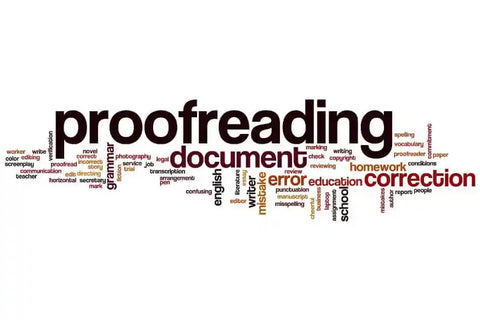Finding Proofreading Space of One’s Own
An appropriate workspace is absolutely essential to success in freelance academic and scientific proofreading, so it should be a primary consideration. Most freelance proofreading takes place in the proofreader’s home, and while this can be a wonderfully productive working environment, it can also become a web of unconquerable distractions. Noise and activity in the household can break the proofreader’s concentration and pull him or her away from the work at hand, and since short proofreading jobs are often tucked in between the other demands of life, it can be difficult enough to find adequate time for them without additional distractions during the moments and hours that are available.
The single most effective solution to this problem is to set up an appropriate workspace in your home and let everyone in the house (or at least those of an age to understand) know that when you are in that space you are not to be disturbed unless there is an emergency. Establishing the right schedule can be incredibly helpful, though it may take some trial and error, and explaining your work situation to family members will generally earn willing cooperation. Going to your workspace should ideally be much like going out to work, and the best way to prevent minor matters from disturbing the close and sustained concentration many scholarly articles and books will demand is to remain in your workspace exactly as you would remain at your desk were you working in an office or library. You do not want to be tied to your computer desk, of course, and short breaks for stretching arms and legs are necessary and can be incredibly refreshing, but remember than even a quick trip to the kitchen for a coffee can be read by others in the household as a sign that you are free to talk and play.
Ideally, your workspace will have a door that you can shut to separate you from the noise and activity elsewhere in your home, but even a makeshift curtain can work wonders if everyone in the home respects it as they would a closed door. Curtains certainly are not soundproof, however, and neither are a lot of interior doors, so you may need to impose some rules about noise in nearby areas of the house while you are working, unless of course you are one of those fortunate people who can concentrate on work while surrounded by auditory chaos. Music can prove helpful, especially what might be called soft background music, by drowning out other more distracting noises. However, when it comes to the critical reading of complex and detailed material for the purpose of editing it for other scholars, both comprehension and accuracy tend to suffer even when only such innocuous sound is present, especially if the author’s English is unclear or there are many inconsistencies requiring detailed attention. In other words, silence, in the context of professional scholarly proofreading, definitely is golden.
We are recruiting Proofreaders, Editors and Copyproofreaders
We are currently seeking experienced proofreaders who are available to proofread professional documents written by non-native English-speaking academic staff from all over the world. This is a good opportunity for people who wish to supplement their income while working from home in their free time, for instance parents who have spare time available when looking after their children or retired professors/lecturers/scientists who still wish to be connected to their field of expertise while earning additional income. Only a native English speaker educated to a master’s or PhD level should apply for this position and it is necessary to be familiar with academic and scientific reference styles, such as Harvard referencing, APA style, Chicago referencing, Vancouver style, AMA style, MLA style and many others.
Why Our Editing and Proofreading Services?
At Proof-Reading-Service.com we offer the highest quality journal article editing, dissertation proofreading and online proofreading services via our large and extremely dedicated team of academic and scientific professionals. All of our proofreaders are native speakers of English who have earned their own postgraduate degrees, and their areas of specialisation cover such a wide range of disciplines that we are able to help our international clientele with research editing to improve and perfect all kinds of academic manuscripts for successful publication. Many of the carefully trained members of our manuscript editing and proofreading team work predominantly on articles intended for publication in scholarly journals, applying painstaking journal editing standards to ensure that the references and formatting used in each paper are in conformity with the journal’s instructions for authors and to correct any grammar, spelling, punctuation or simple typing errors. In this way, we enable our clients to report their research in the clear and accurate ways required to impress acquisitions proofreaders and achieve publication.
Our scientific proofreading services for the authors of a wide variety of scientific journal papers are especially popular, but we also offer manuscript proofreading services and have the experience and expertise to proofread and edit manuscripts in all scholarly disciplines, as well as beyond them. We have team members who specialise in medical proofreading services, and some of our experts dedicate their time exclusively to dissertation proofreading and manuscript proofreading, offering academics the opportunity to improve their use of formatting and language through the most exacting PhD thesis editing and journal article proofreading practices. Whether you are preparing a conference paper for presentation, polishing a progress report to share with colleagues, or facing the daunting task of editing and perfecting any kind of scholarly document for publication, a qualified member of our professional team can provide invaluable assistance and give you greater confidence in your written work.
If you are in the process of preparing an article for an academic or scientific journal, or planning one for the near future, you may well be interested in a new book, Guide to Journal Publication, which is available on our Tips and Advice on Publishing Research in Journals website.








